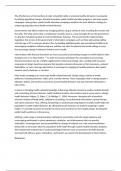The effectiveness of interventions to alter unhealthy habits or promote healthy behaviors is evaluated
by offering legislative changes, financial incentives, public health education programs, and mass media
campaigns. Among these, public health education campaigns would be the most effective strategy for
enhancing population-level health-related behavior.
Governments may affect behavior by changing policies using a variety of tools, including the sermon and
the whip. The whip asserts that a smoking ban in public areas is a clear example of how the government
is using the metaphorical whip to control individuals’ behavior. The second tool for implementing
legislation, the sermon is the government’s information campaigns, such as those advocating waiting
until the age of 21 to consume alcohol. Also, by building additional parks and recreational facilities and
encouraging workplace wellness programs, policies may alter the physical and social settings in ways
that encourage change in behavior linked to one’s health.
Interventions with financial incentives are more successful in promoting changes in health behavior than
standard care or no intervention. (1) In order to increase attendance for vaccination and screening,
financial incentives may be a helpful supplement to behavioral change. Also, working with insurance
companies to design incentive programs that provide customers discounts on their premiums, reduced
deductibles, or more coverage alternatives in exchange for engaging in healthy behaviors like regular
exercise, yearly checkups, or vaccines.
Mass media campaigns can encourage health-related behavior change using a variety of media
platforms, including television, radio, print, and the internet. These campaigns seek to change people’s
attitudes, beliefs, and societal conventions around healthy behavior and also motivate individuals to
take action.
In terms of changing health-related knowledge, influencing attitudes towards a positive healthy lifestyle,
and overcoming structural barriers, public health promotion interventions seek in some ways to change
health behavior (Halper, D., Bates, C.,& Aldridge, S., 2004). Moreover, therapies with a beneficial
outcome include self-help books, telephone counseling, nurse-delivered interventions, group therapy,
and expert assistance. Also, offering scholarships to students pursuing degrees in public health helps the
population’s health-related behavior. By offering financial assistance to students majoring in public
health, it is possible to lessen the burden of school costs and draw in more bright people, boosting the
public health workforce in the process.
Utilizing a wide range of communication methods to successfully reach the target audience and
encouraging participants to share experiences, obstacles, and achievements that can provide
motivation, encouragement, and accountability for change in behavior are a few recommendations
along with my innovative ideas for population-level health through a public health education program.
The fundamental components of social psychological theories such as awareness of health hazards,
perceived self-efficacy, goals, motivations, and barriers are used in the development of interventions.
Reference:




